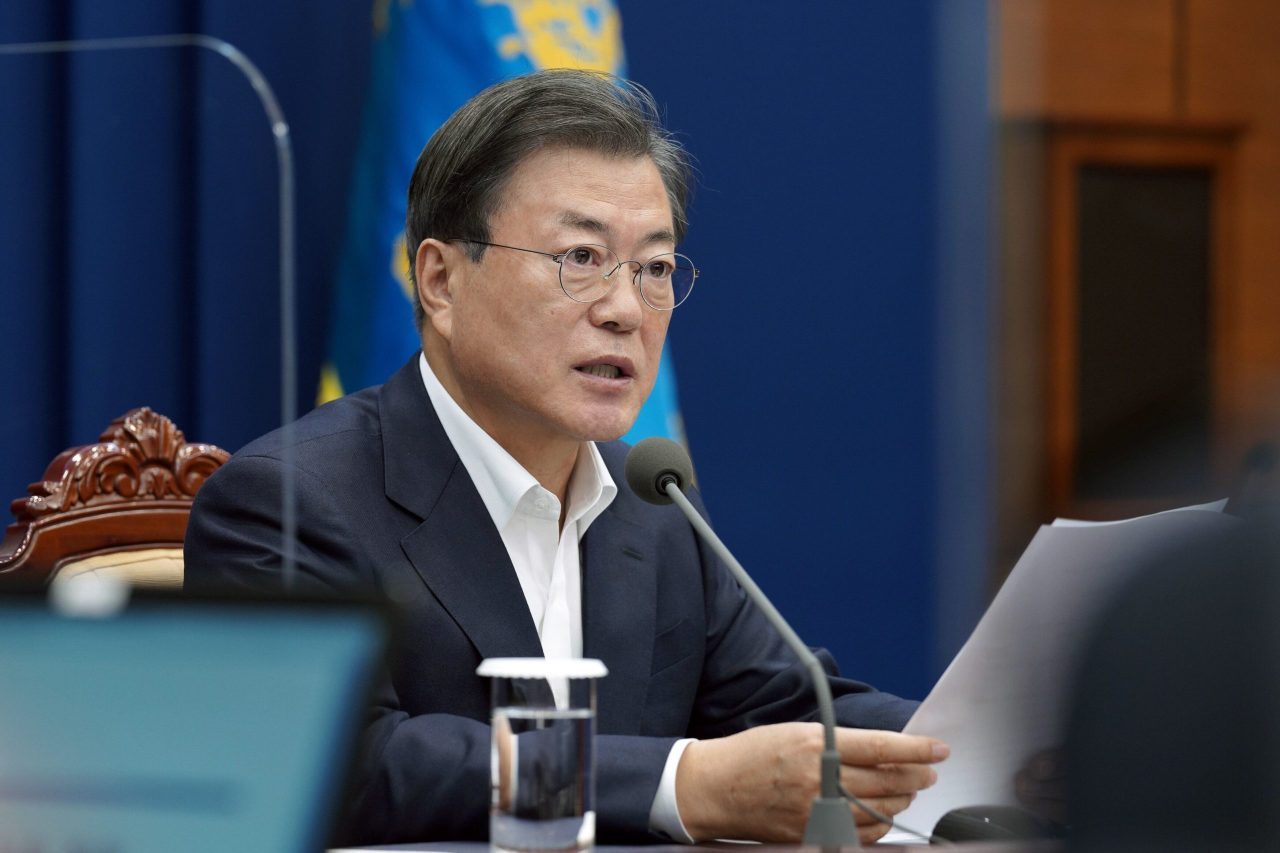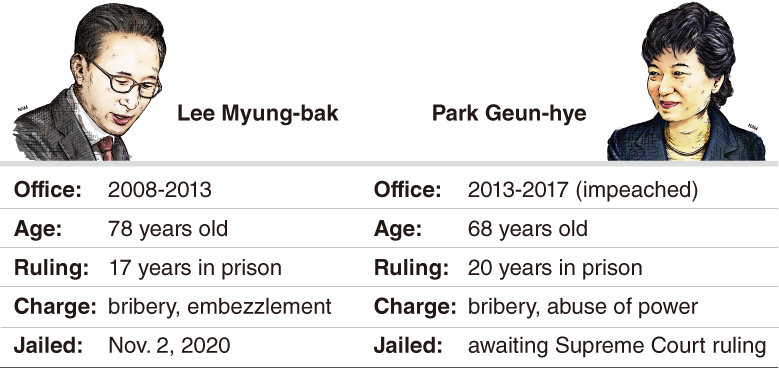[Feature] Will former presidents be pardoned?
Ex-presidents were all granted clemency in the past, but President Moon faces angry public, pressure to keep promises
By Choi Si-youngPublished : Nov. 29, 2020 - 15:39

With two former presidents in jail, facing de facto life imprisonment, South Korea is revisiting its tradition of granting special pardons to convicted former leaders.
While the majority of the public is against it, there are minority voices calling for leniency for former Presidents Lee Myung-bak and Park Geun-hye -- who, without presidential pardons, could spend the rest of their lives in prison, considering their advanced ages.
President Moon Jae-in was elected in 2017 on a pledge to root out injustice and inequality that he said had been overlooked in the past governments, and has vowed not to abuse his pardoning powers. But he may well feel political pressure to grant clemency, experts say.
Previous pardons and public opinion
In the past, ex-Presidents Chun Doo-hwan and Roh Tae-woo, convicted of offenses that included bribery and conspiracy to commit rebellion, were granted clemency to strengthen “national unity.”

In the cases of disgraced leaders Lee, 78, and Park, 68, the public does not seem to have an emphatic stance. Polls conducted in May 2019 by local newspaper Segye Ilbo and pollster Realmeter all showed that 6 out of 10 citizens were against pardoning Park.
Park, the first Korean president ever to be impeached, was ousted for abusing her office by sharing classified information with a confidant and for influence-peddling.
Behind bars since March 2017, she has been convicted of crimes including abuse of power and bribery, awaiting a ruling from the Supreme Court. The appeals court has sentenced her to 20 years in prison.
“She ran the country with her ‘friend’ on the sidelines. And that friend was picking up every favor -- from corporations to the government -- in a way that we couldn’t possibly fathom,” said a 45-year-old office worker in Seoul who asked to be identified only by the surname Chung.
“Pardon? It’s not a matter of timing. It’s just not right.”
But Park still has a clique of loyal supporters known as the Taegeukgi protesters, who periodically hold pro-Park rallies waving Korean flags. They believe in her innocence, saying all evidence against her is either circumstantial or unsubstantiated.
Former President Lee faces harsher public opinion. After going back and forth on bail, he was jailed Nov. 2, as the Supreme Court upheld his 17-year jail term for bribery four days earlier.
The unfavorable public perception of Lee was clearly demonstrated in a poll conducted in February 2018, shortly after prosecutors opened their corruption investigation against him the previous December.
At that time, 7 out of 10 Koreans said Lee should be kept in custody during the investigation, according to a poll by the Korea Society Opinion Institute.
But key figures in Lee’s inner circle all spoke the same language, telling The Korea Herald that Moon should pardon Lee to “bring the people together.”
“The faster the better. It all serves well its purpose, that is, boosting people’s solidarity,” said Kim Hwang-sik, a former prime minister who served under Lee. When asked about public opinion regarding letting Lee go free, Kim said there are always opposing views.
“A majority of the people back Lee’s pardon. And they stand to be recognized,” said Park Hyung-joon, who was Lee’s senior secretary for political affairs, though he offered no evidence. Park said there is already a precedent, referring to ex-Presidents Chun and Roh.
“It (the pardon) should have come sooner,” said Lee Jae-oh, a former minister for special affairs under the Lee administration who later went on to serve as a two-term lawmaker, adding Moon should make the political decision and not be bound by public opinion.
President Moon faces a dilemma
While campaigning for the presidency, Moon vowed he would not abuse pardons or at least use them as sparingly as possible for individuals involved in corruption. He risks breaking that promise and negating his campaign platform, emphasizing a just and fair society, if he readily grants clemency.
Some criticize Moon for having already gone back on his word because he pardoned Lee Kwang-jae, a liberal politician convicted of campaign finance violations.
Lee was freed just in time to run for this year’s parliamentary elections. He secured a seat on the ticket of the ruling Democratic Party of Korea.
“Former Presidents Park and Lee are my predecessors and I feel for them. But I really can’t say anything, given their final rulings are not out yet,” Moon told a press conference in May 2019. Park and Lee were standing trial at the time and their sentences were expected to be tough.
Holding back pardons altogether could backfire. It could encourage Moon’s opposition to rally behind the two jailed conservative leaders ahead of the 2022 presidential election, when Moon is keen to prop up a liberal candidate who will build on his achievements.
“It all depends on how Moon and his party poll in the middle of next year, a few months ahead of the March presidential election in 2022,” Shin Yul, a professor of politics at Myongji University, told The Korea Herald.
“Moon will likely use his pardon power if the ratings fall below 40 to ‘play presidential’ and be shown embracing adversaries to expand his support base,” Shin said, adding that public sentiment would be the least important factor taken into consideration.
“We can’t be sure when exactly that will happen but his rating trajectory will soon tell us.”
By Choi Si-young (siyoungchoi@heraldcorp.com)er">siyoungchoi@heraldcorp.com)
While the majority of the public is against it, there are minority voices calling for leniency for former Presidents Lee Myung-bak and Park Geun-hye -- who, without presidential pardons, could spend the rest of their lives in prison, considering their advanced ages.
President Moon Jae-in was elected in 2017 on a pledge to root out injustice and inequality that he said had been overlooked in the past governments, and has vowed not to abuse his pardoning powers. But he may well feel political pressure to grant clemency, experts say.
Previous pardons and public opinion
In the past, ex-Presidents Chun Doo-hwan and Roh Tae-woo, convicted of offenses that included bribery and conspiracy to commit rebellion, were granted clemency to strengthen “national unity.”

In the cases of disgraced leaders Lee, 78, and Park, 68, the public does not seem to have an emphatic stance. Polls conducted in May 2019 by local newspaper Segye Ilbo and pollster Realmeter all showed that 6 out of 10 citizens were against pardoning Park.
Park, the first Korean president ever to be impeached, was ousted for abusing her office by sharing classified information with a confidant and for influence-peddling.
Behind bars since March 2017, she has been convicted of crimes including abuse of power and bribery, awaiting a ruling from the Supreme Court. The appeals court has sentenced her to 20 years in prison.
“She ran the country with her ‘friend’ on the sidelines. And that friend was picking up every favor -- from corporations to the government -- in a way that we couldn’t possibly fathom,” said a 45-year-old office worker in Seoul who asked to be identified only by the surname Chung.
“Pardon? It’s not a matter of timing. It’s just not right.”
But Park still has a clique of loyal supporters known as the Taegeukgi protesters, who periodically hold pro-Park rallies waving Korean flags. They believe in her innocence, saying all evidence against her is either circumstantial or unsubstantiated.
Former President Lee faces harsher public opinion. After going back and forth on bail, he was jailed Nov. 2, as the Supreme Court upheld his 17-year jail term for bribery four days earlier.
The unfavorable public perception of Lee was clearly demonstrated in a poll conducted in February 2018, shortly after prosecutors opened their corruption investigation against him the previous December.
At that time, 7 out of 10 Koreans said Lee should be kept in custody during the investigation, according to a poll by the Korea Society Opinion Institute.
But key figures in Lee’s inner circle all spoke the same language, telling The Korea Herald that Moon should pardon Lee to “bring the people together.”
“The faster the better. It all serves well its purpose, that is, boosting people’s solidarity,” said Kim Hwang-sik, a former prime minister who served under Lee. When asked about public opinion regarding letting Lee go free, Kim said there are always opposing views.
“A majority of the people back Lee’s pardon. And they stand to be recognized,” said Park Hyung-joon, who was Lee’s senior secretary for political affairs, though he offered no evidence. Park said there is already a precedent, referring to ex-Presidents Chun and Roh.
“It (the pardon) should have come sooner,” said Lee Jae-oh, a former minister for special affairs under the Lee administration who later went on to serve as a two-term lawmaker, adding Moon should make the political decision and not be bound by public opinion.
President Moon faces a dilemma
While campaigning for the presidency, Moon vowed he would not abuse pardons or at least use them as sparingly as possible for individuals involved in corruption. He risks breaking that promise and negating his campaign platform, emphasizing a just and fair society, if he readily grants clemency.
Some criticize Moon for having already gone back on his word because he pardoned Lee Kwang-jae, a liberal politician convicted of campaign finance violations.
Lee was freed just in time to run for this year’s parliamentary elections. He secured a seat on the ticket of the ruling Democratic Party of Korea.
“Former Presidents Park and Lee are my predecessors and I feel for them. But I really can’t say anything, given their final rulings are not out yet,” Moon told a press conference in May 2019. Park and Lee were standing trial at the time and their sentences were expected to be tough.
Holding back pardons altogether could backfire. It could encourage Moon’s opposition to rally behind the two jailed conservative leaders ahead of the 2022 presidential election, when Moon is keen to prop up a liberal candidate who will build on his achievements.
“It all depends on how Moon and his party poll in the middle of next year, a few months ahead of the March presidential election in 2022,” Shin Yul, a professor of politics at Myongji University, told The Korea Herald.
“Moon will likely use his pardon power if the ratings fall below 40 to ‘play presidential’ and be shown embracing adversaries to expand his support base,” Shin said, adding that public sentiment would be the least important factor taken into consideration.
“We can’t be sure when exactly that will happen but his rating trajectory will soon tell us.”
By Choi Si-young (siyoungchoi@heraldcorp.com)er">siyoungchoi@heraldcorp.com)



![[Herald Interview] 'Amid aging population, Korea to invite more young professionals from overseas'](http://res.heraldm.com/phpwas/restmb_idxmake.php?idx=644&simg=/content/image/2024/04/24/20240424050844_0.jpg&u=20240424200058)













![[KH Explains] Korean shipbuilding stocks rally: Real growth or bubble?](http://res.heraldm.com/phpwas/restmb_idxmake.php?idx=652&simg=/content/image/2024/04/25/20240425050656_0.jpg&u=)

